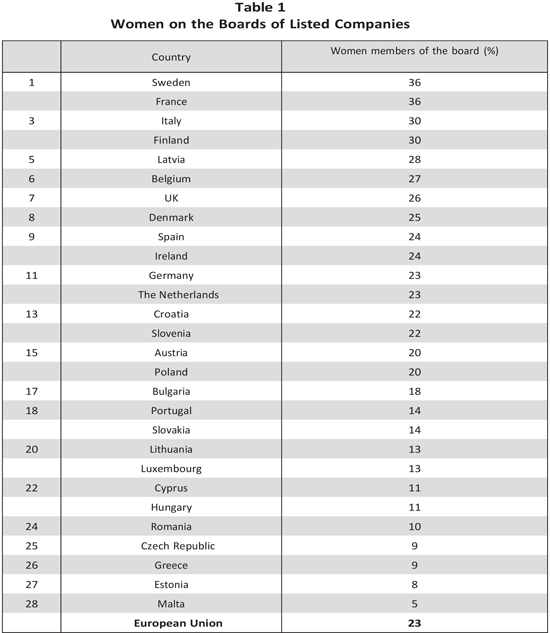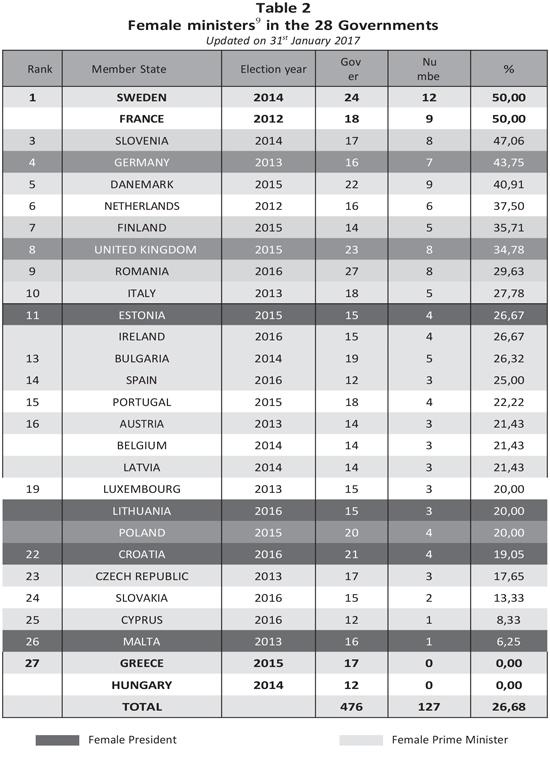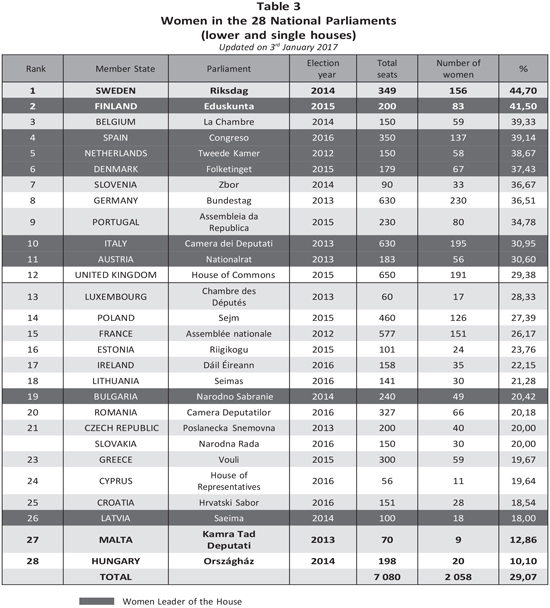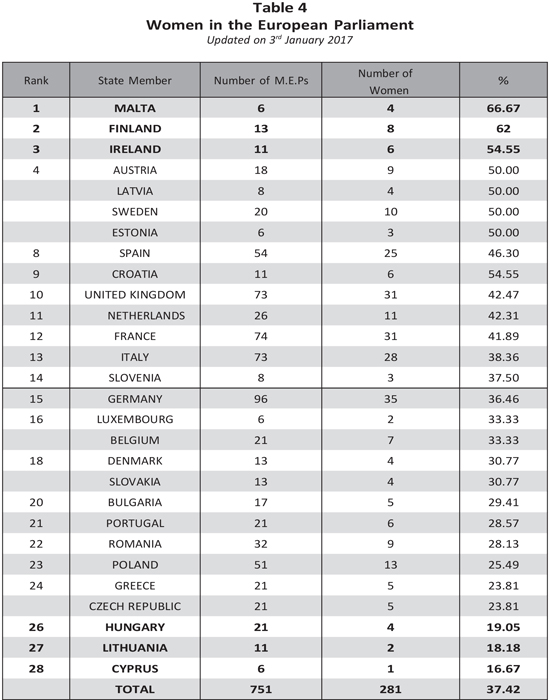European social model
Pascale Joannin
-

Available versions :
EN

Pascale Joannin
Europe is the continent in which women's status is the best in the world. This is where women's place in society is the most developed, even though everything is not yet perfect. From this point of view Europe has a lead over many other places. In terms of promoting women and gender equality the European continent is an example for many other countries, and everywhere in the world women look to Europe as a model to follow. This is one way to counter the sceptical lassitude that now seems to be affecting European integration!
Europe, the Continent in which there are the Most Female Leaders
The analysis of those who occupy the posts of heads of State or that of Prime Minister in all of the countries of the world clearly reveals that Europe lies ahead [1].
Of course there are still not enough of them. Indeed on 1st January 2017 there were 12 female Presidents of the Republic and 6 female Prime Ministers in the world.
Of these 18 women, 9 are in Europe: 5 heads of State (Dalia Grybauskaite in Lithuania since 2009, Marie‑Louise Coleiro Preca in Malta since 2014, Kolinda Grabar Kitarovic in Croatia since 2015, Kersti Kaljulai in Estonia since 2016 and Doris Leuthard in Switzerland since 1st January 2017) and four heads of government (Angela Merkel in Germany since 2005, Erna Solberg in Norway since 2013, Beata Szydlo in Poland since 2015 and Theresa May in the UK since July 2016). Contrary to popular thought that the forces on the left are more inclined towards parity most of these 9 women are from parties on the right or centre-right of the political scale.
In the rest of the world there are also 9 women heads of State or government: 4 in Asia (Bidya Devi Bhandari, President of Nepal since 2015, Tsai Ing-wen, President of Taiwan since 2016, Park Geun-hye, President of South Korea since 2013 - but whose impeachment is now ongoing –, Sheikh Hasina, Prime Minister of Bangladesh since 2009), 3 in Africa (Ellen Johnson Sirleaf, President of Liberia since 2006, Ameenah Gurib-Fakim, President of Mauritius since 2015, Saara Kuugongelwa-Amadhila, Prime Minister of Namibia since 2015) 1 only in America (Michelle Bachelet, President of Chile since 2014) and finally one in Oceania (Hilda Heine, President of the Marshall Islands since 2016).
In all there are as many women leaders in Europe as there are in the rest of the world.
Europe, the Continent which has the Greatest Number of Women Ministers and MPs
The share of women in government or parliament has certainly doubled over the last 20 years but it is still developing far too slowly in spite of incentives in some countries and even constitutional obligations in France for example. But reality tends to prove that perfect equality is far from complete. In the world Europe is performing better however in terms of the numbers of female ministers and MPs.
First of all the European Institutions
Since the resignation of Kristalina Georgieva on 31st December 2016, the European Commission only has 8 women out of 28 Commissioners (28.5%). But they do hold key posts however such as two exclusive competences of the EU: Competition (Margrethe Vestager) and Trade (Cecilia Malmström), and Diplomacy (Federica Mogherini).
In the European Parliament 37.42% of the MEPs are women. Seven Member States send more than 50% of women, which is not the case of any of the Member States in terms of their own national parliament.
In one case, as in any other, it is more than the average that we see at the beginning of January 2017 in the 28 Member States, 26.7% of whose ministers and 29% of whose MPs are women (lower or single houses).
Then come the Member States
This average reveals major differences between Member States.
Only two States (Sweden and France) have a government with an equal number of men and women ministers (fully fledged).
Two have also succeeded in putting together a government with no female members (Greece and Hungary).
Hence the EU average lies about 27%. In the world it is 10 points lower at 17%[2].
In the parliaments the EU average of female MPs is barely higher than the number of Ministers (29%). This situation is far from satisfactory especially since the aim is to have a parliament that is representative of society, half of which comprises women.
Yet if we look carefully at the situation in the parliaments across the world we see again that Europe is a pioneer and the best pupil in the class. Indeed with 29.07% the EU leads ahead of America (27.8%), Africa (23.5%), Asia (19.5%) and Oceania (14.2%)[3].
On a global level the average number of women MPs lies at 23.9%.
It is also in Europe that we see the largest number of women leading the lower house (or single house) of Parliament: 10 (of which 8 European Union countries), 9 in America, Asia and Africa and 1 in Oceania.
Europe, the Continent where Corporate Governance is Most Female
In terms of corporate governance the place occupied by women has developed significantly over the last decade. And this applies on all continents. The rise is particularly edifying: +54% since 2010.
Norway, the leader, introduced quotas of women on the boards of listed companies, which has helped the businesses of this country to raise themselves to the world's leading place in terms of female representation on corporate boards with a female representation of 44%. This record stands unequalled today except by Iceland (46%).
Without having established a system of quotas Sweden lies third worldwide with 36%, on an equal footing with France which adopted a law imposing 40% of women on the corporate boards of the CAC40 by the end of 2017. The goal has practically been achieved.
Many other countries have followed the movement and not just in Europe. Indeed force had to be used, and was often criticised including by women, to take the situation forward, otherwise it would only have been resolved in 170 years' time[4], in other words in 2186!
Likewise women are more qualified but they earn less than men and remain less well placed in positions of high responsibility. Again Europe is positioned ahead of America, Asia, Oceania and Africa.
Hence, and regarding the corporate governance alone, European listed businesses monopolize the first six places in the world in terms of the mandates held by women[5]. Of the first 20 countries in the world to have "feminised" their board, 12 are European.
The European average is 23%[6], i.e. more than the USA (19%)[7]
The world average is 14.7%[8].
Asian businesses have the fewest women working on their boards.
These three examples show that the situation is far from totally satisfactory and a great deal still needs to be done, but it is in Europe that women live best and that their position and rights are best guaranteed.
Whether it is from a political or economic point of view, Europe takes the lead in all of the world rankings in terms of women's position in society.
The status seems enviable in view of the world situation. Does this mean however that Europe is paradise on earth for women? In all events the situation for European women inspires many countries, especially in Africa. Some African countries have "feminised" to an equal or higher level than some European countries.
Present world challenges cannot be overcome by men alone. Women must help towards this. World affairs would incidentally be much better if there were more women in lead positions. This solution has never really been experimented on a grand scale. Would this be so iconoclastic? Not necessarily, because women do "help to change the world."[9]




[1] This text will be published in the 8th edition of the "Schuman Report on Europe. The State of the Union 2017", Editions Lignes de Repères (release in March 2017).
[2] UN Women, August 2016.
[3] Interparliamentary Union December 2016.
[4] World Economic Forum (WEF), Global Gender Gap Report 2016.
[5] Financial times, 1st November 2016.
[6] European Commission, 30th April 2016 and European Women on Boards and ISS, Gender Diversity on European Boards: Realizing Europe's Potential: Progress and Challenges (April 2016).
[7] Catalyst, 2015 Catalyst Census: Women and Men Board Directors (14th June2016).
[8] rédit Suisse, The CS Gender 3000: The Reward for Change 2016.
[9] L'Express, 2nd to 8th November 2016.
Publishing Director : Pascale Joannin
To go further
Institutions
Elise Bernard
—
17 December 2024
Africa and the Middle East
Joël Dine
—
10 December 2024
Member states
Elise Bernard
—
3 December 2024
Asia and the Indo-Pacific
Pierre Andrieu
—
26 November 2024

The Letter
Schuman
European news of the week
Unique in its genre, with its 200,000 subscribers and its editions in 6 languages (French, English, German, Spanish, Polish and Ukrainian), it has brought to you, for 15 years, a summary of European news, more needed now than ever
Versions :




